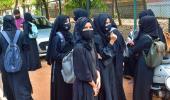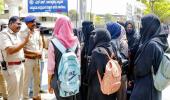The Supreme Court on Thursday delivered a split verdict on the ban on hijabs in Karnataka's educational institutions and referred the matter to the chief justice of India for constituting a larger bench.

While Justice Hemant Gupta dismissed the appeals against the March 15 verdict of the Karnataka high court that had refused to lift the ban and held that hijab is not part of "essential religious practice" in Islamic faith, Justice Sudhanshu Dhulia allowed the pleas and observed that it is ultimately a "matter of choice".
"There is divergence of opinion," Justice Gupta, who was heading the bench, said at the outset while pronouncing the verdict on a batch of 26 petitions.
He said he has framed 11 questions in his verdict and answers to them are against the appellants. The list includes questions on the ambit and scope of the right of freedom of conscience and religion under Article 25 and the right to essential religious practices under Article 25.
In view of the split verdict, the bench directed that the appeals against the high court verdict be placed before the Chief Justice of India for constituting an appropriate larger bench.
While pronouncing his judgement, Justice Dhulia said the high court had probably taken a "wrong path".
"The main thrust of my judgment is that this entire concept of essential religious practices, in my opinion, was not essential for the disposal of the dispute. And the court probably took wrong path there. It was simply a question of Article 19(1) (a), its applicability and Article 25(1) primarily. And it is ultimately a matter of a choice, nothing more, nothing less," he said.
Justice Dhulia said while deciding this case, the education of girl child was on his mind.
"It is common knowledge that already a girl child primarily in rural areas and semi-urban areas has a lot of difficulties to face," he said, adding, "So are we making her life any better, that was also in my mind".
While pronouncing the verdict, Justice Gupta said he has framed 11 questions in his verdict.
He read out the 11 questions, which include what is the ambit and scope of the right of freedom of conscience and religion under Article 25 and what is the ambit and scope of right to essential religious practices under Article 25 of the Constitution.
"Whether fundamental rights of freedom of expression under Article 19 (1) (a) and Right of Privacy under Article 21 are mutually exclusive or are they complementary to each other," Justice Gupta said while reading out the questions.
He said another question framed in his verdict is whether the wearing of hijab is considered as essential religious practice and the students can seek right to wear headscarf to school as a matter of right.
"The answers, according to me, of all these questions are against the appellants. I am proposing to dismiss the appeals," Justice Gupta said.
Justice Dhulia said that he has quashed the state government's February 5, 2022 order which banned wearing clothes that disturb equality, integrity, and public order in schools and colleges.
"In view of the divergent opinions expressed by the bench, the matter be placed before the chief justice for constitution of an appropriate bench," the bench said.
On March 15, the high court had dismissed the petitions filed by a section of Muslim students of the Government Pre-University Girls College in Karnataka's Udupi seeking permission to wear the hijab inside classrooms, ruling it is not a part of the essential religious practice in Islamic faith.
The apex court had reserved its verdict on the pleas on September 22 after hearing arguments in the matter for 10 days.
During the arguments in the top court, a number of counsel appearing for the petitioners had insisted that preventing Muslim girls from wearing the hijab to the classroom will put their education in jeopardy as they might stop attending classes.
Counsel for the petitioners had argued on various aspects, including on the state government's February 5, 2022 order which banned wearing clothes that disturb equality, integrity, and public order in schools and colleges.
Some advocates had also argued that the matter be referred to a five-judge constitution bench.
The counsel appearing for the state had argued that the Karnataka government order that kicked up a row over hijab was "religion neutral".
Insisting that the agitation in support of wearing hijab in educational institutions was not a "spontaneous act" by a few individuals, the state's counsel had argued in the apex court that the government would have been "guilty of dereliction of constitutional duty" if it had not acted the way it did.
The state government's order of February 5, 2022 was challenged by some Muslim girls in the high court.











 © 2025
© 2025